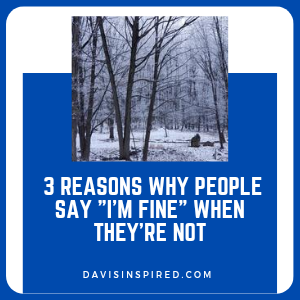3 Reasons Why People Say "I'm Fine" When They're Not
Saying "I'm fine" isn't just polite deflection—it's a power move.
People who are struggling often use "I'm fine" as a way to maintain control over various aspects of their lives. By denying others access to their true feelings, they're establishing boundaries and exercising autonomy over who gets to see their vulnerability.
Our culture's obsession with "authenticity" has become toxic.
The expectation that everyone should be constantly sharing their true feelings undermines the protective function of responses like "I'm fine." These small deceptions create necessary room for us to figure out how we actually feel before we share those feelings with others.
Not every interaction needs to be a deep emotional exchange, and pressuring people to always be "authentic" can actually be its own form of emotional bullying.
Saying "I'm fine" is often an act of compassion, not deception.
When people hide their struggles, they're frequently protecting others from emotional labor or burden. This selfless act gets misinterpreted as dishonesty, when it's actually a form of care—choosing to process your own pain rather than distributing it to others who may not have the capacity to hold it.
What looks like unhealthy repression might actually be a mature recognition that not everyone deserves or can handle your truth.
What's your take? Do you think there are legitimate reasons people hide behind "I'm fine" that we don't acknowledge enough?
_______
~Judy Davis is a motivational speaker, published author and mental health mentor that helps people escape the "I'm Fine" trap with contagious energy, zero filter, and a toolkit that turns burned-out givers into joyful boundary-setters who finally put themselves on their own damn to-do list!
💥Get Your FREE Copy of The Unapologetic Reset - a 3 Day Guide and Claim
the Authentic, Vibrant Life You Deserve Today => HERE💥
